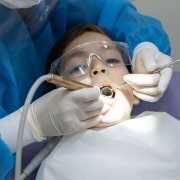Having a Problem With Bad Breath? What That Could Mean
Bad breath is usually amended when you brush your teeth. If your bad breath isn’t fixed with proper tooth brushing practices, then it may be time to see your dentist in Bellbrook, OH. Chronic bad breath, also called halitosis, can be a symptom of a dental problem. Here’s what you should know about bad breath.
What Causes Bad Breath?
Bad breath can be caused by a variety of problems.
- Poor oral hygiene. If your oral hygiene routine is inconsistent or you don’t brush and floss properly, then your bad breath could result from poor brushing, flossing, and dental cleaning habits. Your dentist can show you the proper way to brush and floss if you would like a tutorial the next time you go to the dentist.
- Bacteria. Bad breath that’s caused by a normal amount of bacteria will go away easily when you brush your teeth. However, if you have a cavity, infection, or inflammation with excessive bacteria, brushing may not fix the problem.
- Food in the bloodstream. Some foods continue to hang out in the bloodstream and affect your breath long after you’ve eaten them. Garlic and onions are good examples of this. You may be able to tell if your bad breath is the result of your diet by paying attention to what you’re eating and noticing when your breath seems to be the worst.
What Should You Do If You Have Bad Breath?
If you have bad breath that can’t be fixed by visiting the dentist and don’t believe your problem is related to the food you’re eating, contact your dentist. You could have a condition like gum disease, a cavity, or an infection in your tooth. Your dentist can help you diagnose the problem and recommend treatment.
If you have a cavity, a filling will be required. If you have an infection in your tooth, you may need a root canal treatment.
Get Help for Your Bad Breath From Your Dentist
At Bellbrook Family Dentistry, we provide dental cleanings and exams in Bellbroook, OH. Get your bad breath checked out today: call to make an appointment.










